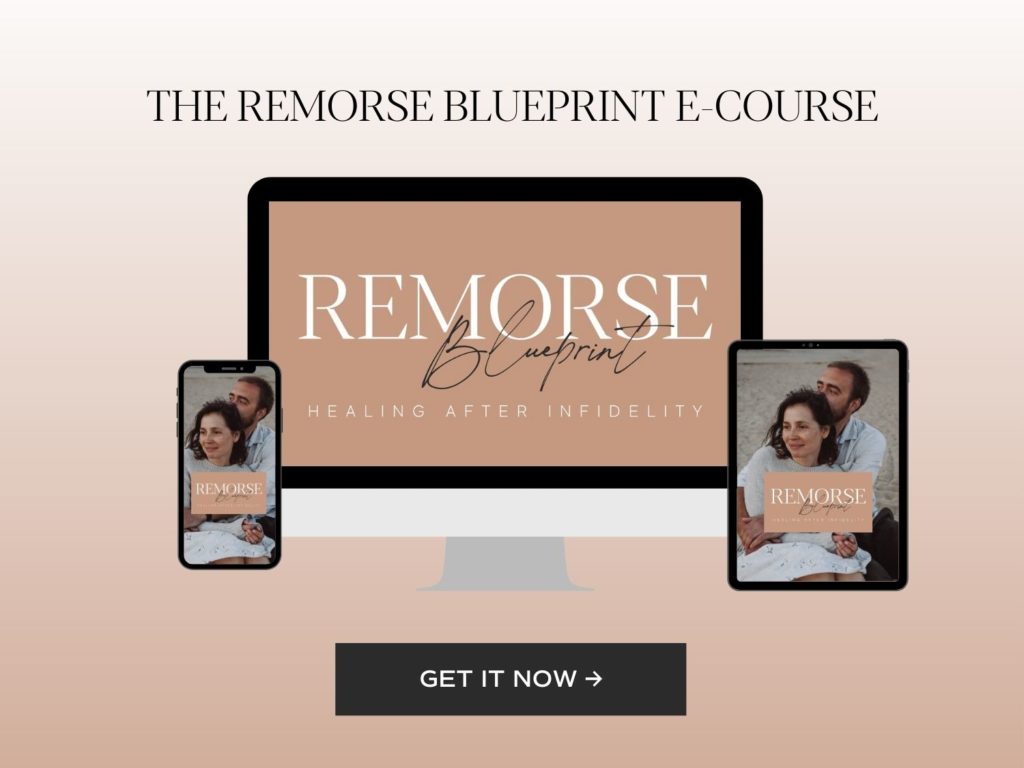“I said I was sorry!”
Tense and exhausted by the fallout of your unfaithfulness, you repeat your apologies. You’re likely anxious, upset, and ready to start recovering from an affair so you may finally move on.
Yet, the wounds of your partner remain open. the betrayal and all its consequences remain unaddressed. At the moment, forgiveness seems to remain out of reach.
How come you can’t get past this? Why doesn’t “I’m sorry” work, no matter how much you say you are?
Why Talk About Remorse Expression?
It’s important that couples discuss post affair remorse and effective expression when recovering from an affair. As much as you may want to recover your marriage, you are likely very far apart from what “sorry” looks like.
As the unfaithful partner, you are the one in possession of the full picture. Therefore, you are the more stable party.
“I’m Sorry” Never Healed Anyone…It’s Simply Step One
In a nutshell, recovering from an affair demands sufficient, actionable, and expressive remorse to be effective.
You’ve admitted cheating. The affair a level of deceit and engagement with another person that severely damaged your relationship. Thus, making you a stranger to your spouse on many levels.
Recovering From an Affair Takes More Than Just “Sorry”
Apologies only acknowledge that you’re willing to start the work. That’s it.
So, What is the Right Way to Express Remorse Now?
First, it may encourage you to know that there is a formula for making your commitment to recovery clear to your spouse. Second, I’ve also provided a Blueprint of an Effective Remorse of actual things you can say to help your partner understand your remorse. Let’s begin with the first point:
Two Components of Effective Remorse:
1. Quantity of Remorseful Expression –
- Apologize as needed. Your ability to provide reassurance depends on your sensitivity to your partner’s need for it… not your need to be forgiven or ideas about how long forgiveness should take.
- Try to keep apologies appropriate given your situation. Again, respond with the long game in mind. Moderation is key. Your entire relationship needn’t center on your apologies. Think “not too much and not too little.”
- Try not to clam up when your partner is emotional or resistant. It’s better to apologize more than less.
- Try to be less reactionary and more responsive and sensitive. Remember, you are trying to communicate your dedication to recovering from an affair. Your remorse is a thoughtful response to the consequences of your mistakes. Not a reaction to your partner’s anger or sadness. Do your best to keep your expressions of remorse separate from your spouse’s feelings and thoughts.
2. Quality of Remorseful Expression
- Accept that “I’m sorry” doesn’t cut it.
- Avoid brief, closed statements of apology. Communication without depth or engagement will not do now. Your partner’s world has been rocked. They need to hear from you. Your expressions of remorse have to be substantive. You need to explain WHAT you’re sorry for and WHY.
- Nonverbals matter immensely. They communicate respect and sincerity. Keep your tone open, never dismissive. Consciously use facial expressions that convey an apologetic message. Willingly engage. Appearing to be withdrawn sends a contradictory message of disinterest.
- Take responsibility vs. being defensive. This no time for manipulation. Don’t play coy or innocent, it undermines trust. Avoid accusing or blaming your partner, it creates resentment.
- Listen and acknowledge your partner’s experience. Work hard at validating what they’ve gone through and how they feel. Avoid minimizing any part of your partner’s pain, upset, or response.
Now. What does all this look like on a practical level? If “I’m sorry” doesn’t cut it, what should you say and how should you say it?
Consider My Blueprint for Effective Remorse When Recovering From An Affair
The Remorse Blueprint is an instant online course for you to access at any time.
It is designed to help you do the following:
- Identify whether you are expressing remorse in a helpful way.
- Understand the 6 parts of an effective remorse expression.
- Craft and express your remorse effectively (using a downloadable blueprint for direction).
- Make remorseful expressions sincerely and as often as necessary by using the ideas in the course and blueprint.
When all is said and done, don’t you want your partner to feel safe with you again? Do what it takes to ensure his or her feelings are known, validated, and respected. Communicating what you are sorry for and why allows for hope and warmth to return. Thus forgiveness will become more possible.
Begin Infidelity Recovery With Idit Sharoni and her Team of Relationship Experts
 I do hope this information is helpful and encourages you to take steps toward recovering from an affair and creating a healthier relationship. For more support and information, please consider learning about my Infidelity Recovery Program or contact me for a consultation soon. My Miami FL-based counseling practice would love to help your relationship thrive no matter where you are in the country. To start recovering from an affair, follow these steps:
I do hope this information is helpful and encourages you to take steps toward recovering from an affair and creating a healthier relationship. For more support and information, please consider learning about my Infidelity Recovery Program or contact me for a consultation soon. My Miami FL-based counseling practice would love to help your relationship thrive no matter where you are in the country. To start recovering from an affair, follow these steps:
- Schedule a free consultation
- Meet with our infidelity recovery expert therapist for a 45-minute initial consultation
- Start healing and rebuilding trust with our affair recovery coaching program
Other Services Offered at Relationship Experts
Infidelity Recovery isn’t the only service offered in our Miami FL-based counseling practice. Other mental health services our relationship counselors provide include couples therapy and marriage counseling, communication counseling, and online therapy. For more useful relationship information, please visit my podcast!
Heading



